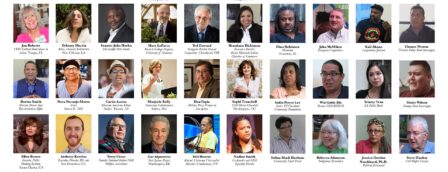Updated August 2019
How to make money nurture life instead of Wall Street.
FOOD FOR THOUGHT & CONVERSATION
-
The Ruth Chris Steak House story demonstrates the importance of the role of business ownership in community wellbeing. Are there examples in your community similar to the Ruth Chris Steak House story where the behavior of a company was determined by its ownership?
-
How a system is organized determines how a system behaves. Please discuss the differences you see in a system organized around capital and one organized around life that Marjorie mentions.
-
If our economic system was organized about life, one aspect of it might be our metrics for economic performance. For example, the Gross Domestic Project measures the market value of all goods produced in a country. So, the BP Spill was a boon to the GDP because of all the clean-up costs. The Genuine Progress Indicators (GPI) measures economic, social and environmental progress. To learn more about Genuine Progress Indicators, take a look at how the State of Washington is using the GPI along with GDP to measure it state’s economy.
-
Marjorie gives several examples of ownership designs of businesses that promote the well-being of people, the planet and community. Please share your favorite story.
-
Please share your thoughts about Marjorie’s example of the John Lewis Department Store in England, which has the amazing mission to increase employee happiness. How is their bottom line different from the bottom line some corporations espouse that they do “people planet and profit”. Do you know of anything at all similar to John Lewis happening here in the US?
-
Municipal and Community Ownership is demonstrated by the Wind Farm in Denmark, which supplies 22% of energy. In 2018, the U.S. wind energy industry supported 114,000 American jobs, more than 500 domestic factories and revenue of more than $1 billion for states and communities that host wind farms, according to a recently released annual market report from the American Wind Energy Association. Thoughts?
-
The U.S. Conference of Mayors approved a historic resolution that establishes support from the nation’s mayors for the goal of moving to 100 percent clean and renewable energy in cities nationwide. 222 mayors have signed onto this vision in their community as part of the Mayors for 100% Clean Energy. Has your city signed on?
-
Six South Dakota Sioux Tribes — the Cheyenne River, Crow Creek, Oglala, Rosebud, Sisseton Wahpeton, and Yankton Tribes — have decided to pool their considerable wind power resources to create the largest utility-grade wind installation in the country. The Tribes will own the Project and will realize the full benefit of the sales of power to customers beyond their communities.
-
Progress: to date: March 2016 The Oceti Sakowin Power Authority (OSPA) officially established;January 2017: Innovation Funds received from Rockefeller Foundation, Clinton Foundation and Bush Foundation. Completed technical, environmental and financial work related to developing wind power generation and transmission system across the reservations; world-class technical consultants were selected and discussions started with potential co-developer/operator partners and turbine manufacturers; 2019 Anticipate issuing first tranche of power revenue bonds and starting construction. Please share any thoughts you may have about this initiative.
-
In Maine, the unique partnership of the State Marine Resources Department and the local lobster industry resulted in rules governing water access and fishing that benefits the life of lobsters and the livelihoods of local lobstering families. Are you aware of any other such partnership that has resulted in positive management of the Commons?
-
Also in Maine, Coastal Enterprises, a Community Development Financial Institution with the mission to provide economic development through social justice initiatives funded a local lobster cooperative’s effort to build a warehouse for boats and supplies on the waterfront. CDFI also helped put a 25 foot working waterfront easement on the property modeled after a conservation easement, which was funded by a state bond program. The easement is a covenant that attaches permanently to the property deed guaranteeing that the land will always be used for commercial fishing. This resulted in two dozen more working waterfronts being preserved on Maine’s coastline allowing hundreds of fishing families to support themselves. What is the Community Development Financial Institution in your hometown doing?
-
One example of Generative Economy that Marjorie describes is Cooperatives and over 140 Million Americans participate in cooperatives. One form of cooperatives is consumer cooperatives. If you are participating in a cooperative please share your experience.
ACTIONS
-
Learn about Community Development Financial Institutions in your area. What projects/work have they accomplished?
-
Explore and learn more about Generative Economy and stories of success, form a discussion group online or in your home using The Making of a Democratic Economy co-authored by Marjorie Kelly and Ted Howard.
-
Invite friends, colleagues or community members to view this video with you and host a conversation.
ABOUT MARJORIE
Marjorie Kelly is Vice President and Senior Fellow with The Democracy Collaborative. Previously, she was a Fellow with the Tellus Institute in Boston, where she led a variety of consulting and research projects, including co-founding Corporation 20/20, a five-year initiative that brought together hundreds of leaders from business, finance, civil society, and law to explore how to redesign corporations to integrate social and environmental concerns into their governing DNA. For five years Marjorie was also a lead consultant with WealthWorks, a Ford Foundation initiative to develop and test a new approach to rural community development. Before that, she was co-founder and, for 20 years, president of Business Ethics magazine, known for its listing of the 100 Best Corporate Citizens. Marjorie authored Owning Our Future: The Emerging Ownership Revolution, which was awarded the Nautilus Book Award.
Additional Information
An excellent report on highly effective economic models and best practices for creating the New Economy in your community. Broad-Based Ownership Models as Tools for Job Creation and Community Development: A Report by Marjorie Kelly, Steve Dubb & Violeta Duncan
[ultimate-recipe id=”7083″ template=”101″]
